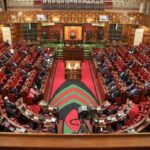The government has warned that motorists may face the grim possibility of fuel prices reaching a high of KSh300 per liter in the coming week, driven by escalating tensions in the Middle East.
The warning was issued Monday by Energy Cabinet Secretary David Chirchir saying it could surge by as much as KSh80 per litre, a significant increase from the current KSh217 per liter, primarily attributing this alarming forecast to the ongoing turmoil in the Middle East.
Chirchir outlined the looming crisis during a meeting with the National Dialogue Committee, stressing that the price of crude oil could skyrocket to as much as $150 per barrel if the conflict in the Gaza Strip between Israel and Hamas persists.
“We can’t do much when it comes to international pricing of petroleum which has soared from $70 per barrel and I read an article from the Financial Times that the prices could go up to $150 due to the Israel-Hamas war,” he said.
That, he said, “could literally mean our prices going up to KSh300 per litre but we hope it doesn’t get there.”
The Energy Cabinet Secretary clarified that the government’s capacity to influence such spikes in fuel costs remains limited, given that these developments are primarily driven by global issues, including inflation and geopolitical conflicts.
While neither Israel nor the besieged Gaza Strip are significant oil producers, markets have been jolted by fears that the conflict could lead to wider regional instability.
The Middle East is home to some of the world’s biggest major oil producers, including Iran and Saudi Arabia.
Analysts have portended that the US could tighten sanctions on Iran should it be implicated in Hamas’ attack on Israel, which could further strain an already undersupplied oil market.
In mid-October, a litre of super petrol went up by KSh5.72, Diesel by KSh4.48, and Kerosene by KSh2.45.
This means that Nairobi residents pay KSh217.36 for petrol, KSh205.47 for diesel, and KSh204.46 for kerosene.
EPRA attributes higher prices to an increase in the average landed cost of imported super that went up by 3.93% to $805.14 in September from the previous month.
Likewise, diesel rose by 7.07% to $845.72 per cubic meter, while kerosene increased by 5.01% to $868.70 per cubic meter during the same period.
Government to Government deal
Chirchir pointed out that the situation on escalating fuel prices could have worsened saying the government-to-government oil importation has managed to cushion Kenyans from the increased oil prices pushed by external shocks.
“This has helped us manage the speculative tendencies which were there where over 100 market companies were looking for dollars exacerbating the depreciation. This has helped manage the depreciation of the Kenyan shilling from 3% to 1%,” he noted.
Kenya settled KSh35.32 billion in credit fuel that was signed early this year under the government-to-government (G-to-G) deal with Saudi Arabia and the United Arab Emirates (UAE).
On 10 March, 2023, the Government of Kenya entered into Master Framework Agreements (MFAs) with Aramco Trading Fujairah FZE (Aramco), Abu Dhabi National Oil Company (ADNOC), Global Trading Ltd., and Emirates National Oil Company (Singapore) Private Limited (ENOC) for the supply of petroleum products under a G-to-G arrangement.
He expressed that the inflation in United States and Canada in the post COVID-19 recovery period has precipitated the unavailability of dollars in the country has impacted the depreciation of the shilling against the dollar.
Fuel in Kenya has been increasing regularly, resulting in a high cost of living in Kenya. The current fuel rise has resulted in increased cost of transport, especially to consumer goods making the ordinary citizen spend more on basic needs such as food resulting to poverty.
Matatu owners have hiked fares in view of the increased fuel costs, and driver-partners in the multitude of ride-sharing platforms available within the Kenyan market are threatening to embark on a go-slow in view of the same.
There is an increase in prices of ordinary commodities such as bread, milk and maize flour. All these considered translate to less income in the hands of the ordinary Kenyan and consequently reduced consumer spending.





























